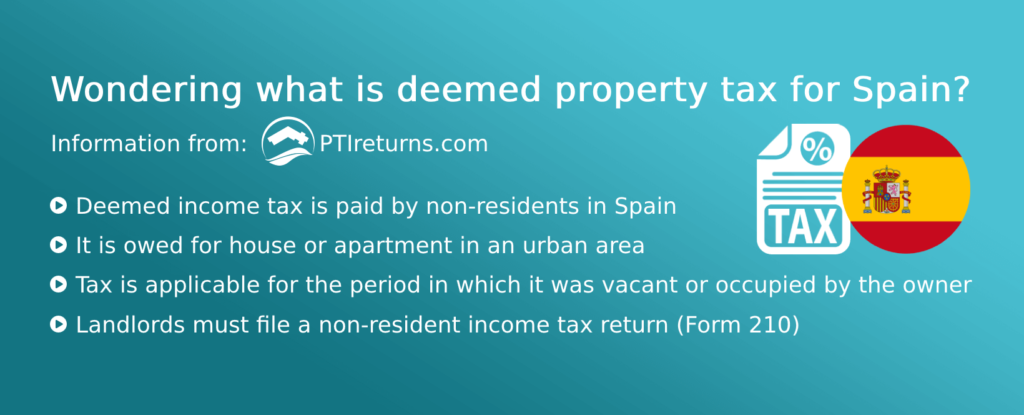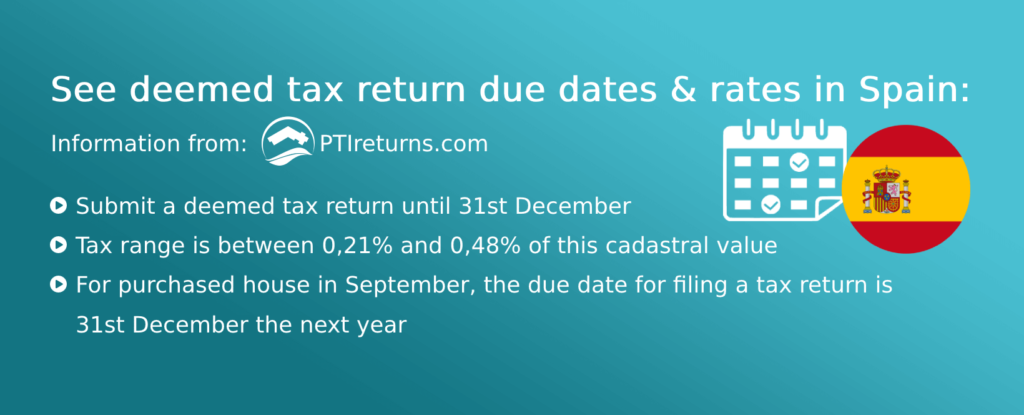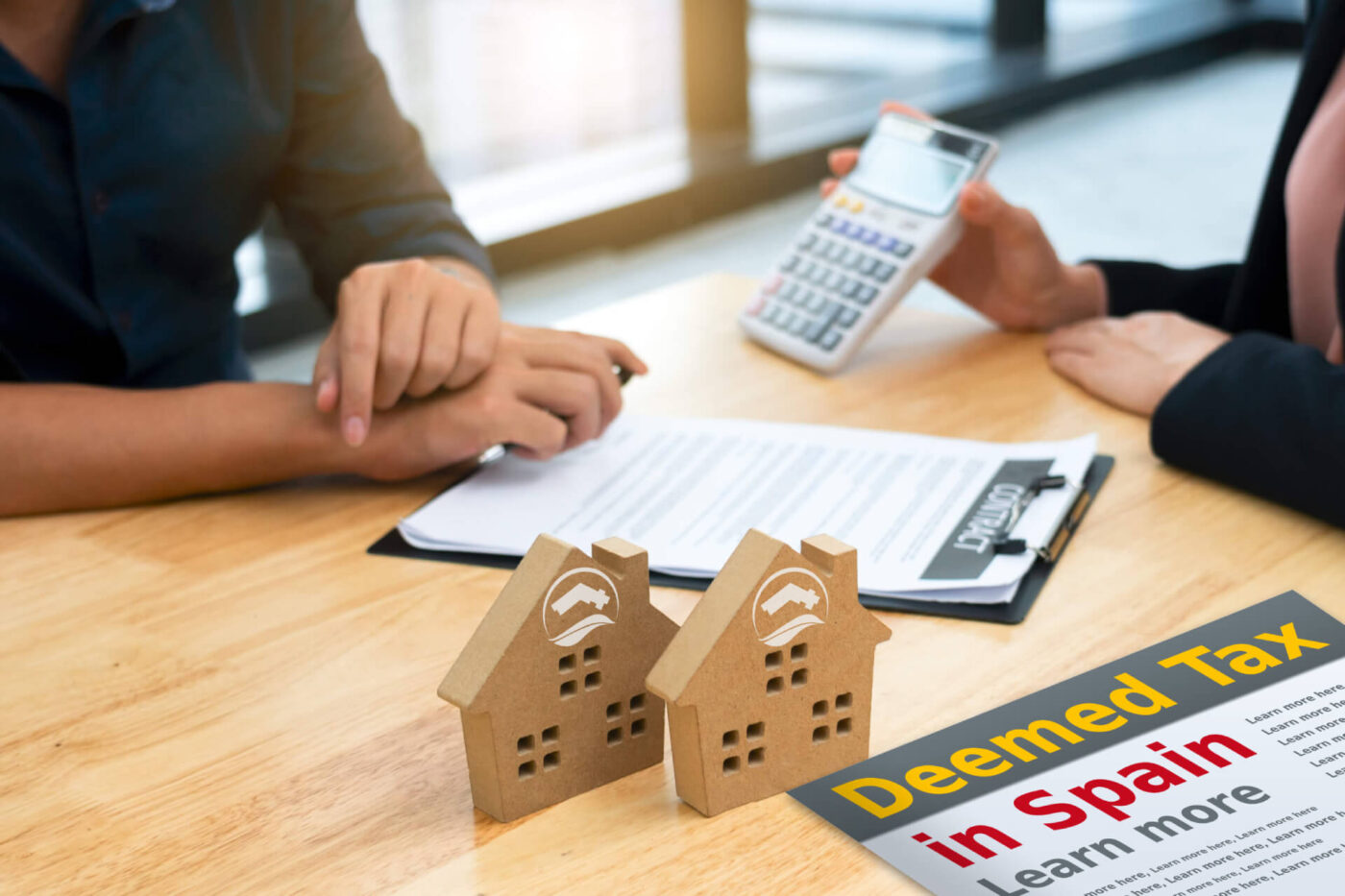Last Updated on October 10, 2025
If you own property in Spain but don’t rent it out, you still owe a yearly tax on its deemed rental value. This often surprises non-resident owners — but it’s a legal requirement known as Deemed Income Tax or Modelo 210.
Failing to declare this tax can lead to fines and interest from the Spanish Tax Agency (Agencia Tributaria). Here’s everything you need to know to stay compliant, calculate what you owe, and file on time.
At a Glance
-
Tax name: Deemed Income Tax (Modelo 210)
-
Who must file: Non-residents who own Spanish property not rented all year
-
Deadline: 23 December of the following year
-
Tax rate: 19 % for EU/EEA residents · 24 % for others
-
Based on: Cadastral value (valor catastral) shown on your IBI bill
What Is Deemed Tax in Spain?
Deemed tax — also called imputed tax or renta imputada de inmuebles urbanos — applies to non-residents who own property in Spain that was not rented for some or all of the year.
Even if the property sits empty or you use it only for holidays, Spain treats it as if it earned rental income, and you must declare that “deemed income” through Form Modelo 210.
If your property was partly rented, you’ll file two returns: one for the rental period and one for the vacant period.

What Counts as Urban Property?
“Urban property” (inmueble urbano) refers to homes, villas, or apartments in developed areas with public infrastructure such as roads, utilities, and services.
Most second homes, holiday apartments, and buy-to-let units fall into this category — and therefore trigger the deemed income obligation for non-residents.

When to File Your Deemed Income Tax Return
The filing deadline for non-residents is 23 December of the year following the tax year.
Example: if you owned a property in 2023 that was not rented out, you must file your 2023 Modelo 210 return by 23 December 2024.
Late filings can lead to surcharges between 5 % and 20 % plus interest, so it’s best to submit early.
How to File the Modelo 210 Form
You can file online through the official Agencia Tributaria website using your NIE and digital certificate.
If you prefer not to handle the Spanish paperwork yourself, you can authorize a professional tax representative — such as PTI Returns — to prepare and file on your behalf.
You’ll need:
-
Your NIE number
-
The property’s cadastral value from your IBI bill
-
Ownership share and address details
💡 Tip: PTI Returns can complete and submit your deemed income tax online — fast, accurate, and fully compliant.
How Is Deemed Income Calculated?
Deemed income is based on your property’s cadastral value (valor catastral), found on your IBI (local property tax) invoice. You can find the most recent valor cadastral on your annual property tax bill (Impuesto sobre Bienes Inmuebles – IBI).
- Determine the cadastral value.
- Apply the official percentage:
- 1.1 % if the value has been reviewed in the past 10 years
- 2 % if it hasn’t been reviewed recently
- Multiply that figure by the tax rate:
- 19 % for EU/EEA residents
- 24 % for non-EU residents
Example:
If your property’s cadastral value is €100 000 and it was last updated 5 years ago:
100 000 × 1.1 % = €1 100 (imputed income)
EU resident pays 19 % of €1 100 = €209.

What Is Cadastral Value and How to Find It?
The cadastral value is the Spanish government’s assessed value of your property, used for tax purposes. It is usually lower than the market price and determined by local councils based on:
-
Location and land quality
-
Age and condition of the building
-
Market data in your municipality
You can find it:
-
On your annual IBI bill, or
-
By requesting it from your Ayuntamiento (local council) or through the Online Land Registry using an electronic DNI.
Common Mistakes to Avoid
-
Confusing IBI (local property tax) with the Modelo 210 (national non-resident tax).
-
Forgetting to file for years when the property was empty.
-
Using outdated cadastral values.
-
Assuming joint owners can file a single return (each must file separately).
Avoiding these errors keeps you compliant and prevents late-payment penalties.
What If You Sell Your Spanish Property?
Before selling, make sure all your previous Modelo 210 filings are up to date.
The buyer’s solicitor may request proof that your taxes are settled before transferring funds, and missing returns can delay the sale.
What If You Own Through a Company?
If the property is held through a Spanish company, the deemed tax doesn’t apply.
However, if the company is registered in a tax haven, the managers must file Form 213 annually and pay a similar charge.
What If You’re a UK or Irish Citizen?
Spain has double-taxation agreements with the UK and Ireland. This means the same income won’t be taxed twice.
Your PTI Returns account manager can advise on how the credit applies when you report rental income in your home country.
How PTI Returns Can Help
Navigating Spain’s tax system as a non-resident can be complex.
PTI Returns’ team of bilingual specialists handle everything — from retrieving cadastral details to filing your Modelo 210 accurately and on time.
We’ll communicate directly with the Spanish tax authorities, keeping you informed at every step.

FAQs about Spain’s Deemed Income Tax
How much rent income is taxable?
The tax rate for non-residents is flat 19% (for residents of the EU) and 24% for others.
What if you are a UK or an Irish citizen?
Double taxation relief will be applied since there are double taxation agreements between Spain and UK/ Ireland. Your Property Tax International’ account manager can assist you with double taxation agreements.

Do I need to file if I only use the property for holidays?
Yes — personal use counts as “deemed income,” so a Modelo 210 return is still required.
Can I deduct expenses from this tax?
No. Deemed tax is based on notional rental value, so expenses aren’t deductible.
What documents do I need to file?
Your NIE, IBI bill, and property ownership details.
Can I back-file for previous years?
Yes — you can usually file up to four years retroactively.
Do joint owners file separately?
Yes, each owner must submit their own Modelo 210 for their ownership share.
- You may also be interested in:

